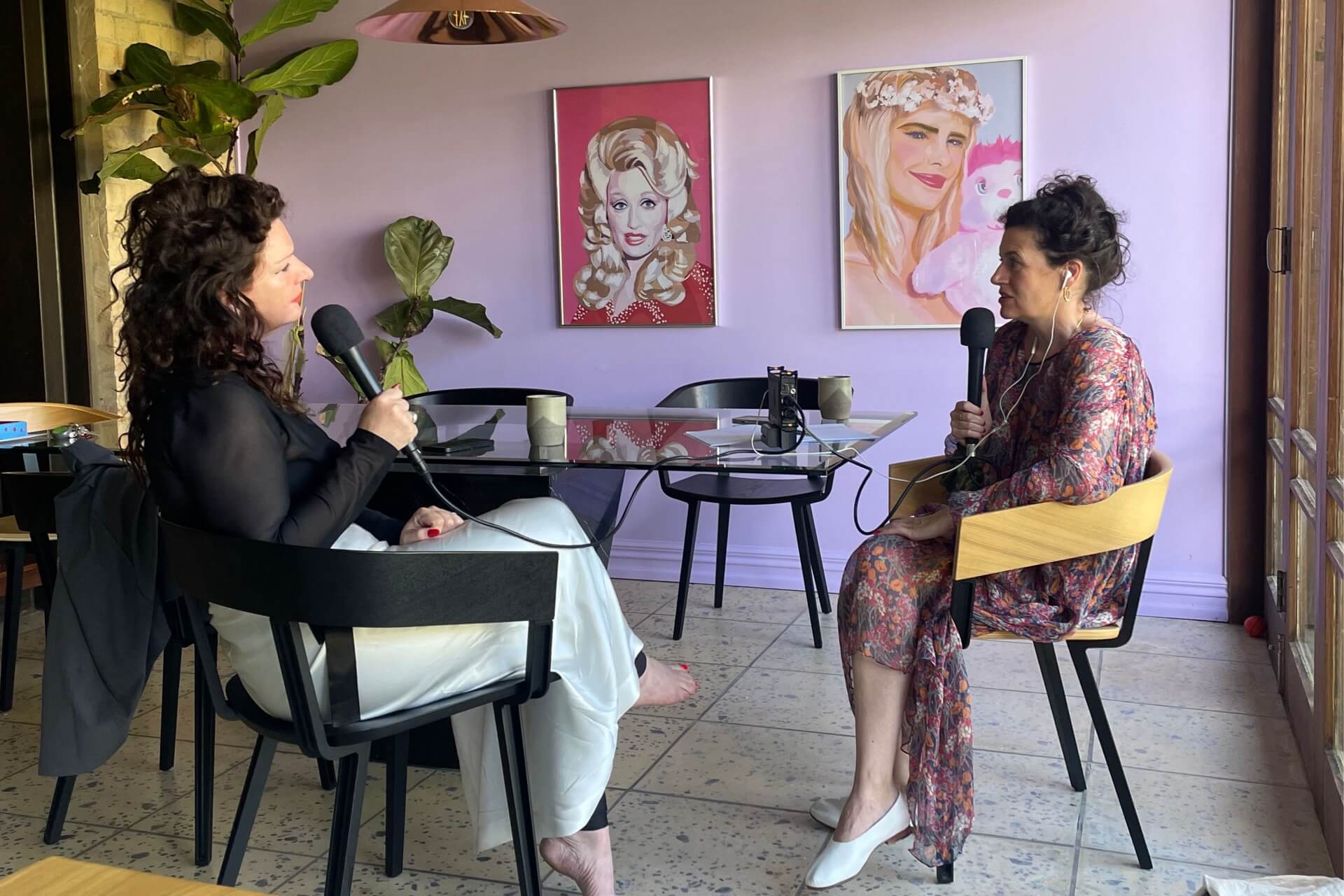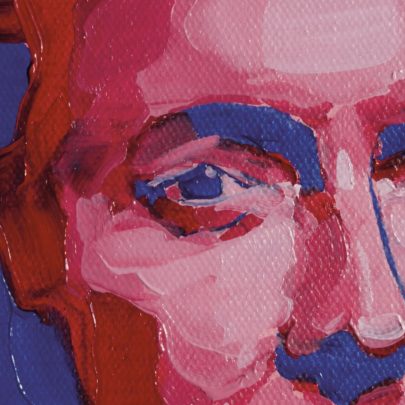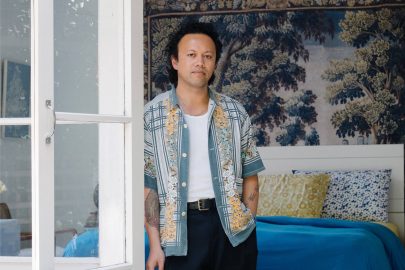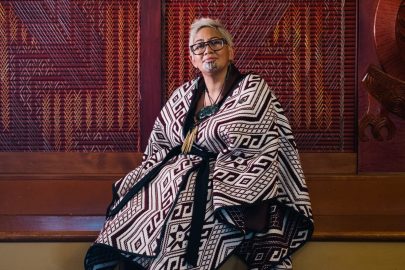Mar 13, 2024 Fashion
Noelle McCarthy: Kristine, tell me about Gloria.
Kristine Crabb: I feel like as I grow older and more confident, I’m identifying more and more as an artist, making work that resonates, that is transformative. Gloria is my expression of that. It’s about collaboration, and creating and stimulating all of our senses. I’m trained in making clothing, which I find symbolic of the way you’re feeling and how you present yourself in the world. So it’s that, and all the technical things that go into it, which I’m obsessed with. Then, there’s also the collaborations with other artists, on words, imagery and events that stimulate all of the five — or six! — senses, helping people enter this world of Gloria.
I always thought of you as an artist, Kristine, did you not see yourself as one previously?
I guess, to be honest, I was always a bit ashamed about it. I didn’t really know where I would stand as an artist, because you know there’s been this perception of fashion as maybe a bit shallow and doubts in the art world about whether it’s a valid form. The way I see it, everybody wears clothes, and so it’s very democratic. Everybody can actually consume clothes because they’re functional objects. But I do feel like it’s my feminist manifesto! And that comes back to a sense of empowerment. My original outlook — I mean this is going back decades, to when I started right at the beginning — was always kind of anti-beauty or, at least, anti-‘regular feminine sexuality’. People who wear my clothes, they pick up on that energy, because it’s a really personal sexuality, boldness, freedom.
The last time I interviewed you, in 2019, it was for the end of Miss Crabb, the label and store you’d run since 2004. We talked then about the development of your designs and how you felt your supporters evolved with you over time — do you feel, after more than 20 years in the business, people are starting to get what you’re doing?
It’s been a really interesting time-based project. My intention has been, always, that these clothes last a long time. That’s part of why I put so much work into refining these really, really simple building blocks. That’s the investment I make. And that’s so they have longevity and endurance in terms of style and quality — I’m intending them to last a long time. And that’s a little bit anti-fashion as well, right? So when you’re starting out, that can be a hard concept for people to get their heads around. And because we do invest so much into the clothes, they’re comparatively expensive. But for me, the way I see it, they’re high value, but you know it’s an investment, a subversive kind of style. It has to be a conscious decision. So that takes time for customers to kind of get on board with, and that’s a real challenge when you’re running a business. I used to take it personally at Miss Crabb. I used to feel like, ‘I’ve done all this work, why’s it all taking so long to be commercially successful?’ And that was quite hard. But then over time, it did become really successful. And, you know, the momentum was so strong, you know, so I felt like a lot of my ideas were actually common sense in the end.
Yes — when you were starting out we weren’t necessarily having the same conversations around sustainability, around the environment, around the impact of garment industries.
Yeah, that’s so huge now, but it’s always been inherent in my work. To me, it’s obvious. I don’t know that you can ever say, ‘I’m truly sustainable’, because you’re making new clothes, after all. But as a business, you’ve got to try to be as efficient as you can, and that’s what I’ve always tried to do.
The scene is changing, though, isn’t it? You’re on Ponsonby Rd still, but it feels different? That’s me getting older, maybe.
No, it’s different. Fashion is different, the whole landscape in which people consume and buy, and see the clothes, all of that is much more digital. I’m quite hands on, craft based, and a lot of the business is just marketing and, like, creating imagery and trying to reach people — which is understandable because everyone lives in this busy digital world, you know. That’s a big part of it.
But Gloria’s going to be about people coming together IRL, isn’t it?
Yeah, I love events. They’re just about engaging all the senses. Events are so impactful, and they’re a real juxtaposition to our digital, more insular kind of life now. I love that impulse to be together. Our events, the places we spend our time together, have that potential to be more meaningful — how you spend your time, where you put yourself, who with. You just want it all to be a bit yummy now, when you go out.
And you’re energised by that?
Definitely. Yeah, I love it. I mean, it’s always nerve-racking. You never know what’s going to happen. But it’s a skill, as well, that you just get better at as you get more experienced.
Fashion’s meant to be so glamorous, but you are really honest about the effort that goes into designing, like, on the daily.
Some days I’m like, ‘What are you doing? Why are you doing all this? You’re so buzzy!’ But then I’ll get this eureka! moment, and it’s just like, ‘Oh, my God!’ You know when you know you’ve pulled it off? You’ve made something. That’s the kind of beauty that I chase. That’s where I feel like nothing else matters. Like, all the other pressures of life, nothing else matters when you get to that point.
Do you still get the same sense of inspiration and satisfaction working with shapes and symmetries from the past, or do you need to keep inventing new ones?
Both, I think. Like, we made the new Magenta robe in 2020, and that’s a future classic. It’s just going to get stronger.
I remember you were making the Magenta, and I was working on a draft of my book. Do you remember the conversations we would have? When you told me that you’d done, like, 18 versions?
Yes, that’s right!
It gave me such comfort, because I’d be going back over a particular paragraph, or even a sentence, over and over again sometimes, just to get it right, and really struggling. Some bits I could get right the first time, and others I had to go over and over.
Yes, just having that luxury, eh, of doing it until you’re happy with it. That’s really cool. But no one tells you that at the start. I was like, ‘God, I must be such a terrible designer, because it’s taking me so long!’
Gloria is very personal. It’s biographical — it’s named for your grandmother. Is there a connection to art there, too?
Like I was saying earlier, I haven’t always identified as an artist. Partly that’s because my upbringing was very practical and very business minded. Identifying as an artist, within my family, that’s something new for us, for me and for them. But also, I do love the practicality of making clothes! In my life, with having three children, I’ve had to have clothes that go with the flow of my body and go with the flow of my lifestyle, all that work and family life. Clothes that make me feel glamorous and make me feel like I’m on top of all my shit. Having children can be really buzzy on your sense of self! I’ve needed to feel like myself.
One of the areas you’re going to focus on with Gloria is suiting and lingerie — that’s perfect for you because your practice is all about refinement, right?
Making anything involves an editing process. I’ve got this massive archive of work now, and so it’s a refining process of what I’ve already done, in building on and refining. That’s what I’m doing with the suiting and lingerie. And then I’m just gonna put it out, and see what happens. Keep having faith in it. It’s a real challenge, but I’ve always worked, and thankfully it’s always worked out.
Have you started thinking about legacy? Your kids are getting older now — do you know what they might end up doing? Or how they might look at you and what you do?
I feel like modern life is so broad — there’s so many options now for young people. Which is cool and amazing, but can be overwhelming, too. I don’t know, though, how my work will actually evolve with technology and what people want to wear and stuff, because I know that what we do is to make things by hand. It does feel kind of the opposite of modern life to be doing what we’re doing. But I think it’s also, like, a tonic for modern life to have these beautiful natural fibers that are handmade and sculpted so carefully.






